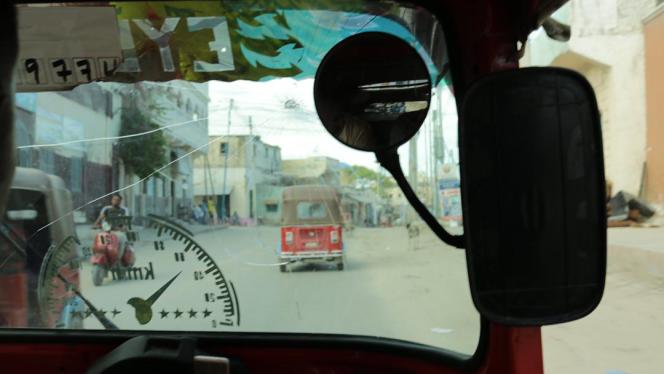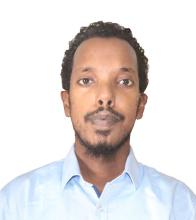Thursday 21 November 2024
Hostile lenses: backpacking through Somalia as a journalist

Mohamed Gabobe describes his experiences navigating Mogadishu as a journalist, why he moved to the city and how he handles sensitive stories
Journalism is a craft akin to a form of artwork, with many of the most esteemed and prestigious journalists finding their way onto the media landscape under most unexpected circumstances. I also found my path into journalism in the most unlikely of ways. As with many Somalis in the west, the ruinous legacy of 1991 scattered us across the globe. My parents left Somalia during the on-set of the Somali civil war as rebel groups took up arms across the country. Not being able to tell the trajectory of the war, they fled with what little they had. It turned out to be a life-saving decision. As a result, they were lucky enough to be spared much of the violence that many of their loved ones and friends became victims of.
Three decades later I found myself returning to the country that my parents had fled. Prior to relocating to Somalia, I spent my childhood moving from state to state across the US. Like the nomadic customs that many Somalis hold dearly back home, it remained with my intermediate family as we moved around the US.
In my early 20’s I would take my maiden trip to Somalia, and it changed my worldview. I was exposed to a country and society that was unusual compared to what I was used to. Young men my age holding AK-47’s and driving battle wagons, foreign troops patrolling the streets in armored convoys. These encounters drew me closer to a world I knew nothing about before visiting Mogadishu. I later returned to the states and developed my passion for writing, then began experimenting with my newfound art by contributing to different Somali news websites, which drew me into the world of journalism, news and analysis.
Several years later upon returning to Mogadishu in the spring of 2022, I was picked up by a relative in a bajaj (tuk-tuk). All I had was a bag of luggage containing a few pairs of clothes, a camera, and my laptop. It was the midst of Ramadan, and the sun was scorching—a significant contrast from the cold winds of North America to which I’d grown accustomed.
When arriving in Mogadishu, I didn't expect to be treated differently. I thought of myself as a member of the diaspora returning home but the long shadow of America’s so-called War on Terror complicated that. One of the first things I noticed was the presence of Ugandan troops everywhere. Tasked with security, Ugandan soldiers from the Western-backed African Union coalition, dubbed ATMIS, have more say and jurisdiction over matters at the airport than the local Somalis.
Going through repeated screenings and searches, I felt like a foreigner on what I thought of as my own soil. It’s one thing to see it on television but it’s totally different when you experience a thorough search in person.
I finally made my way to Mogadishu’s Huriwaa district in the north of the city, where metal shacks lined both sides of the road leading to my home.
Every time a rickshaw sped past, residue from the dirt roads would fill the air with the thick stench of livestock all around you. This part of the city had a reputation for being a hotbed for militancy due to the routine skirmishes between the government and al-Shabaab and occasional IED attacks.
The Northern district of Huriwaa was an impoverished quarter of the city, where the urban poor had gathered. A mere 20 minutes' drive from the city center but it felt like a world away. The roads hadn’t been renovated in decades. At first sight, you think you’re driving over potholes but then realize artillery fire and mortar shells had befallen these same roads that I now found myself travelling on. Young men, even younger than me holding AK-47’s in oversized military attire stood at checkpoints puffing away cigarettes as cars passed.
On a routine basis throughout my stay in the Huriwaa district, you’d hear bursts of machine gunfire and heavy blasts after sunset. After a while, I thought the blasts and gunfire were getting louder, but then I realised they weren't getting louder, just closer. When I asked why, the locals would tell me there were military outposts within walking distance of this neighbourhood, so attacks were common.
But the most astonishing thing I picked up was that the war-weary populace has gotten so accustomed to living under fire that they could easily tell if the sound of the blast was from an RPG, mortar round, or grenade. Familiarity with these sounds and the ability to differentiate them is a skill you’d probably prefer not to have acquired through experience.
All of the families living in my neighbourhood were among the less fortunate inhabitants of this coastal city. Most had resettled in this area from early 2012 onwards after much of the urban warfare in the city came to an end.
From early 2007 to late 2011, Mogadishu and its environs witnessed a mass exodus as it became a ghost town with US-backed Ethiopian troops battling Islamist rebels, which soon evolved into Islamist allies turning the guns on each other in the years that followed reducing the city to rubble once more.
When living in a city marked with the scars of war, where tit for tat bombings still take place means you encounter people from all walks of life and sometimes get drawn closer to people that you least expect.
Mahdi Omar, a merchant that owns a table stand in Mogadishu’s Bakara Market, for example, has become a good friend of mine. He’d only been working in the Bakara Market for three years after fleeing his home in a rural village near the district of Leggo in the neighbouring Lower Shabelle region.
Violence in his home region, like many others, led to Mogadishu, surprisingly a safe haven and a place of economic opportunity for many Somalis despite its chronic instability. Mahdi had little choice though.
Sometimes it would be men in uniform, other times, rival clan militias or other actors in the region making it difficult for him to stay in his hometown.
“Throughout the night we'd often hear engines roaring overhead. We knew they were planes,” told me. “The occasional angry shouts of foreigners speaking what sounds like English also echoed in the distance.”
Mahdi eventually decided to leave with the little money he had and make his way to Xamar. He finally earned enough to set up a table stand in the Bakara Market, placing him among the thousands of entrepreneurs in the bustling business center.
“I hope one day to make enough money to resettle my family in a nice home in Mogadishu, away from the sounds of planes and the footsteps of advancing soldiers,” he tells me with a sharp smirk on his face.
There are also days when you find yourself lying in bed, staring inertly at the ceiling, wondering how you ended up here. Sometimes you’ll receive random calls from unrecognised numbers late at night, while other times it’ll be in the early morning hours. I rarely, if ever, answer unrecognised numbers. It could be a death threat or maybe some trollster calling to harass you. The mental strain is immense. Oftentimes you’ll find yourself in a constant state of fear and not even know it. Similarly, private numbers are banned here (in Somalia) due to security reasons. But most people use more than one SIM card. This doesn’t pertain to only journalists. I’ve gotten to the point of using several. It comes with the territory. But after a while, you grow accustomed to the danger and learn to adapt.
As you become more accustomed to life in Mogadishu, the city begins to reveal itself to you. It’s a place where interests trump clan loyalties, friendships, and even social norms. One thing that caught my attention was how certain taboo activities have become prevalent among the city’s youth, which were dismissed or ignored by wider society.
The sex trade is an example, and I encountered women prepared to share their story. At first, fellow journalists doubted that I could pull this story off. Their doubts weren’t personal; my colleagues thought it was unlikely that anyone would want to go on the record in Mogadishu to discuss the issue. Most people here feign ignorance about it and look away, but I thought this aspect of Mogadishu’s underworld deserved coverage.
Gaining access and their confidence was a challenge, so I had to make multiple visits and slowly get to know the characters in the story I wanted to tell, spending a lot of time around seedy downscale or upscale hotels or feared and sewage-filled slums where barefoot children innocently played football.
One after another, I would meet with women involved in sex work, often relying on an intermediary who helped settle nerves and put the women at ease. Contacts are crucial here to get a feel for the texture of the city’s different communities as well as what drives Mogadishu, so restricting oneself to the Halane compound or the hotels where Somali politicians dwell won’t do. It limits what we can report on political intrigue and security threats.
Despite having strong contacts, it wasn’t easy. In most conflict zones, people tend to be cautious, but in Somalia’s case, this goes to the extreme. Trust is a luxury and is one of the least-used words in my experience. Your neighbour or closest relatives could be spying on you on behalf of a state or non-state actor, and you wouldn’t even know it.
This isn’t a movie but everyday life in Mogadishu. Many of them thought I had ulterior motives. I recall one day, one of the women asked me, “What do you really want because no one here [in Somalia] does these things [reports on these issues]?” Encounters like that reminded me that I was onto something that could turn out to be revelatory.
At the end, I was able to interview two young women involved in sex work in Mogadishu and eventually penned a piece for BBC Africa titled Inside Somalia’s Hidden World of Sex Work, in collaboration with a colleague based in London. No matter how exciting it felt going over the final draft prior to publication, I was worried. I didn’t know what type of reaction the piece would spark. The truth is, when covering sensitive stories like this that aren't run-of-the-mill in Mogadishu, you can never predict the outcome. It’s a risk you take, and I've learned greatly from it.
Life in this city will change you. Sometimes I'd find myself at a loss for words to truly describe my time in Mogadishu as a journalist. I've learned the importance of being on the ground when reporting compared to writing from abroad. Sure, it comes with extreme risks at times, but no journey ends smoothly without sacrifice, and my time in Somalia has taught me that.








